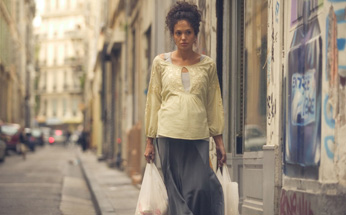|
|
Movie Review: A Mighty HeartBy Shane JenkinsJune 25, 2007
Much has been made of Jolie's casting in the role of Mariane - the real Mariane Pearl is a black woman, while Jolie is, well, not. I'm of two minds about this. On one hand, I think the idea of color-blind casting is a good one - find the person who can best perform the role, regardless of their race. On the other hand, as good as Jolie is here, I'm not sure that she performed the role any better than another actor would have. There doesn't appear to be an overabundance of roles for black women, especially juicy, high-profile ones such as this. It feels a little unfair to me that, since Jolie can have pretty much her pick of roles, she was chosen for this one, while I'm sure that Thandie Newton, say, was never really considered for the role of Lara Croft. It would only be fair if it worked both ways. I'm aware that the real-life Mariane requested Jolie to play her, but there's always an inherent danger in having your subject be too intimately involved with your production. Mariane Pearl is a journalist, not a filmmaker, and the filmmakers should have decided on the best actor, regardless of her wishes. The central problem with the movie is that there is not really much to it. By centering the action around Mariane, the film becomes a repetitive series of phone calls and e-mails. Every morning, she wakes up, calls people, tries calling Daniel's cell phone, attempts to get information about the people her husband was interviewing, and fills in information on a convoluted chart. Like in Rosencranz and Guildenstern Are Dead, it becomes apparent that we are following the wrong person, while the more interesting story happens elsewhere, out of our sight. I'm not in any way saying this to dismiss the real Mrs. Pearl's plight; it's just that there is not enough to this part of her story to credibly fill out a feature-length movie. Winterbottom attempts to compensate for this monotony by making liberal use of flashbacks. Since Daniel leaves for his ill-fated interview in the first few minutes of the film, we get to know him primarily through these memories and dreams of Mariane. Played by Dan Futterman, Daniel exudes a sort of sexy-nerd charm, and we can see why Mariane is in love with him. He has a disarming, self-effacing demeanor that would seem to make him a good interviewer. I'm certainly no fan of the conventional biopic, but I would like to have seen more of Daniel, though I suppose a movie tracing his last days from his perspective would be almost unbearable to watch. Winterbottom is a director who likes challenges. He recently filmed the "unfilmable" novel Tristram Shandy by turning it into a mockumentary about the making of the movie. He changed up the "concert film" genre by weaving hardcore sex between musical numbers by Franz Ferdinand and The Dandy Warhols in 9 Songs. So he would seem to be up to the task of making this difficult subject matter into something transcendent, or at least watchable. And he succeeds on some level. He has an eye for uncovering the mundane details of everyday life that make these characters seem real. The crying child. Bottles of half-finished water sitting around. The way Mariane picks up a book about childbirth and puts it down without reading it. Ultimately, though, he gets painted into a corner. We know how, and even when the story will end, and since we don't see Daniel's ordeal, there's nowhere to go and nothing to for us to do but wait. And wait.
|

|
|
|

|
Thursday, October 31, 2024
© 2024 Box Office Prophets, a division of One Of Us, Inc.


